Soldiers of the Pope: The Ancestral Tradition of the Pontifical Swiss Guard in the Vatican
Some of the new guards shared their special experience with the Register on the sidelines of the May 6 ceremonies.

VATICAN CITY — The emblematic Pontifical Swiss Guard, entrusted with the safety of the Successor of Peter and the Apostolic Palace for more than five centuries, welcomed 23 new recruits to its ranks in an annual ceremony at the Vatican.
On the afternoon of May 6, 23 Swiss Guards — easily identifiable thanks to their Renaissance-style parti-colored uniforms — took the oath during a ceremony in the Vatican’s St. Damasus Courtyard in the presence of Msgr. Paolo Borgia, the assessor of the secretary of state, and Archbishop Georg Gänswein, the prefect of the Papal Household, who were representing Pope Francis.
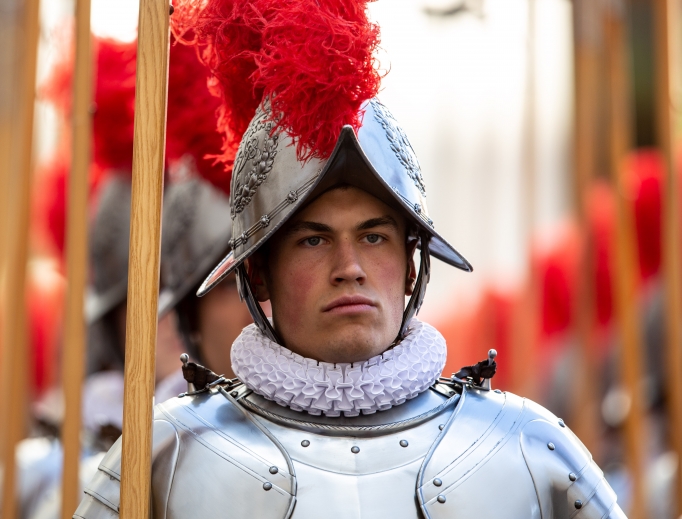
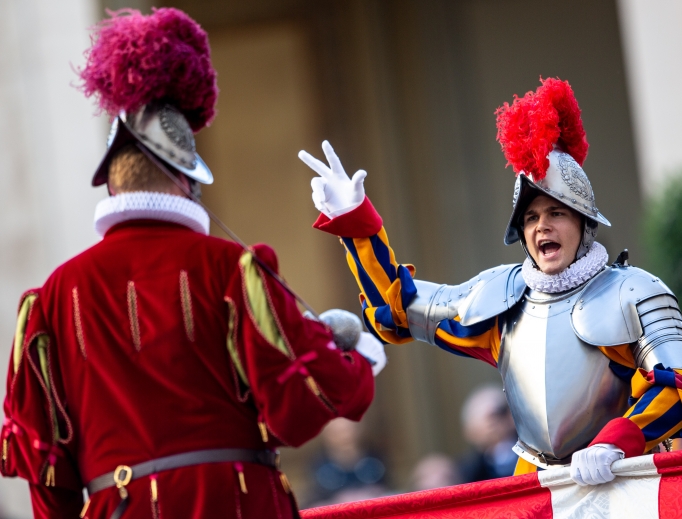
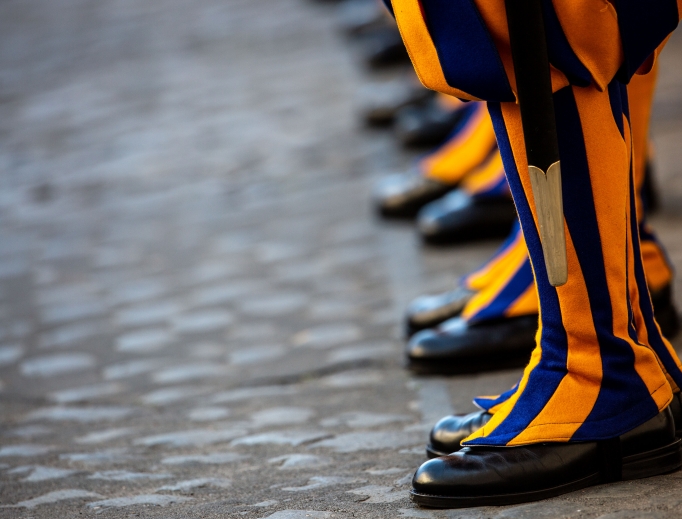
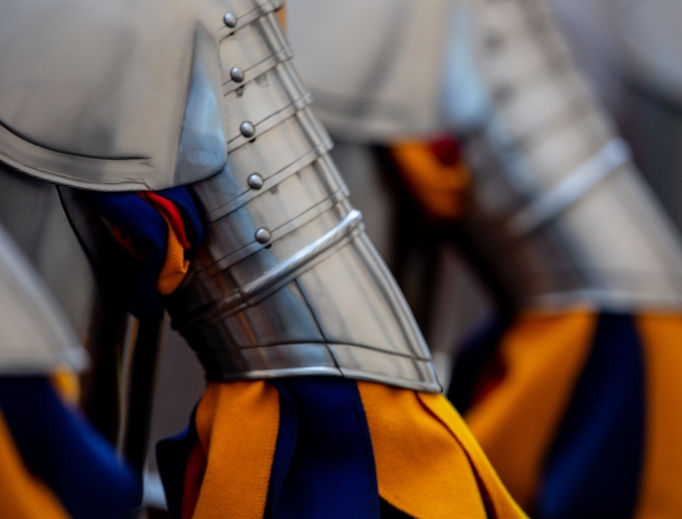
The date of the annual event commemorates the 147 Swiss Guards who died defending Pope Clement VII during the sack of Rome by the troops of Charles V in 1527. The guard is one of the oldest continuously active military units.
“It is a huge honor to serve the Holy Father, keeping in mind the great things our predecessors did before us,” Samuele Menghini, a new recruit from Ticino, told the Register before taking the oath.
The ceremony was the culmination of a three-day celebration for new recruits and their families, starting with an audience of the guards with Pope Francis the morning of May 4. During a May 5 wreath-laying ceremony in honor of the deceased of 1527, in the Square of the Roman Proto-Martyrs, several worthy guards were presented with decorations honoring their service to the Pope.
“The reality of the barracks teaches certain ethical and spiritual principles that reflect many of the values that we need in life: dialogue, loyalty, balance in relationships, mutual understanding,” Pope Francis said in his address to the Swiss Guards Corps May 4. “You have the chance to experience moments of joy and, inevitably, difficult moments typical of a collective experience.”
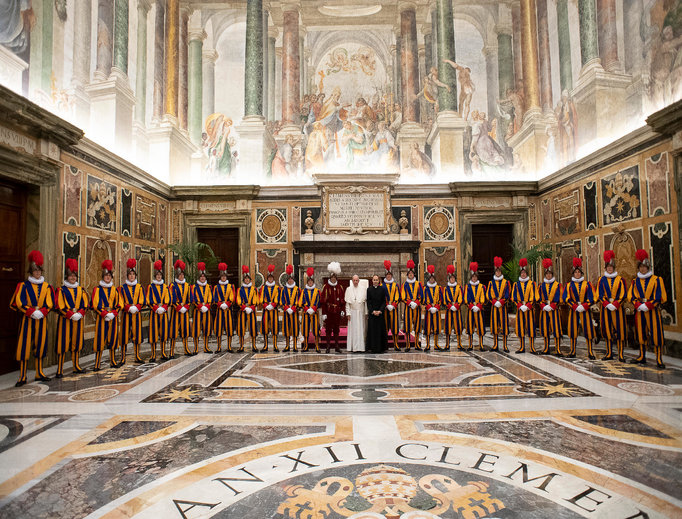
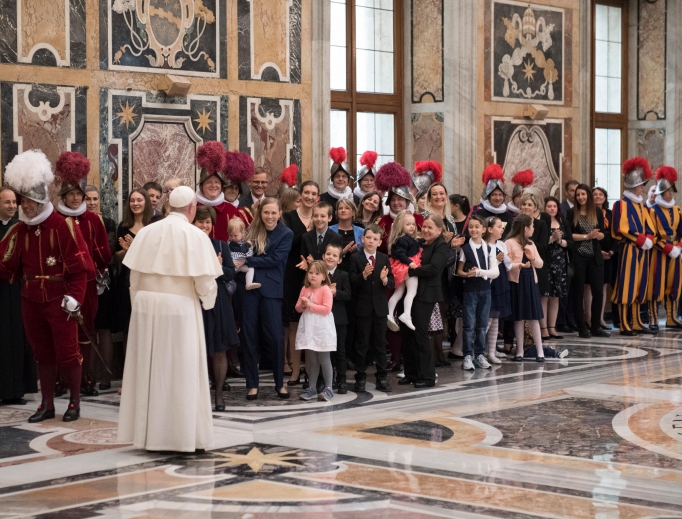
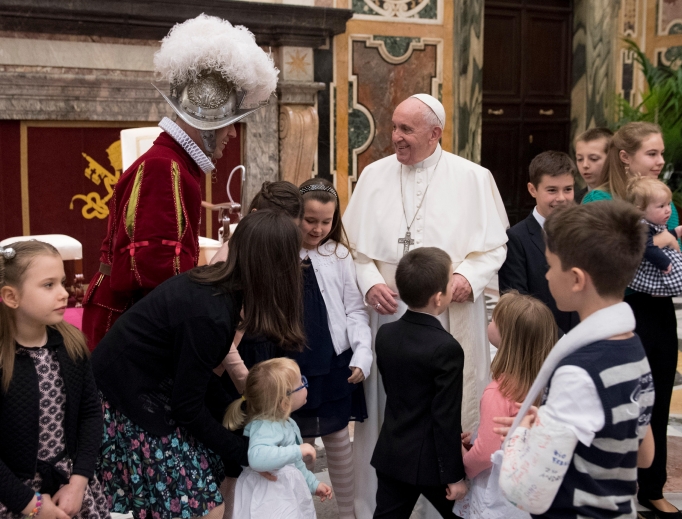
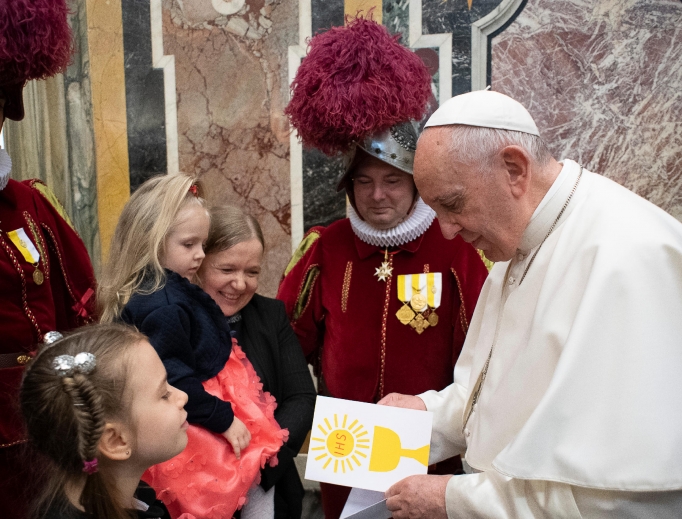
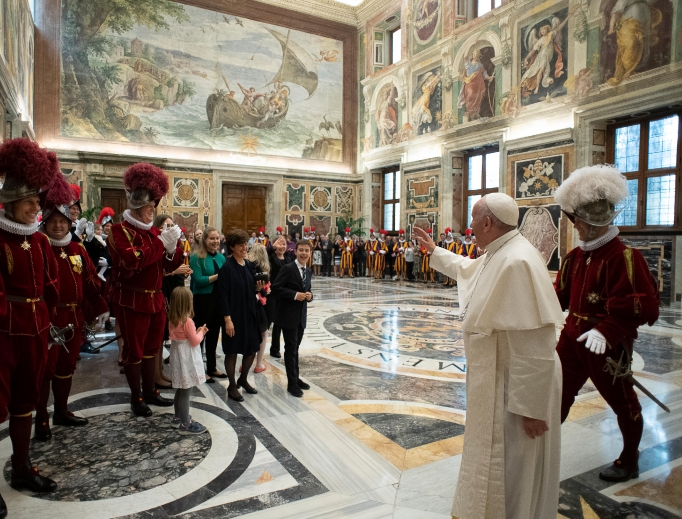
The Pope’s words seem to reflect the challenges the Pontifical Guard is currently experiencing because of an increasing staffing problem, resulting in a heavier burden of work.
This year, according to the guard’s commander, Col. Christoph Graf, the number of new recruits is 30% lower compared with 2018, although the Pope recently agreed to raise the contingent from 110 to 135. Though 23 young men joined this year, 40 recruits are necessary to renew the contingent, as most of the guards leave after two years of service.
Vatican Requirements
The Swiss Guard’s ranks are filled according to Vatican requirements: Each candidate must be a practicing Catholic Swiss man between the ages of 19 and 30, among other criteria.
Even though it is a time-honored army, new methods are being employed to encourage new recruits.
Communication programs were launched in schools and in social media to reach out more directly to possible future candidates.
“We are willing to change the belief that being a Swiss Guard only means to stand still holding a halberd,” said Graf.
While that assignment is perhaps the most familiar to the world, he pointed out at a press event May 4 that there are a great number of important security tasks entrusted to the guards, who follow the Pope everywhere, including on his international trips. Such service can lead to other opportunities. For instance, vice-corporal Didier Grandjean, who has been part of the Swiss Guard for seven years, was promoted to a noncommissioned officer after three years of service.
“The more we stay in the Guard, the more interesting is the mission,” Grandjean told the Register.
The new recruitment strategy is coupled with other measures, such as the possibility — first allowed three years ago — for guards to marry and have children while serving the Pope.
As one of the main features of the renewed recruitment efforts, the Guard announced plans in 2017 to renovate the barracks, a 19th-century building unsuitable for the current needs of the guards, especially those with families. A fundraising campaign will be launched in the coming years through an ad hoc foundation to bring together the 50 million euros required to reorganize the living spaces.
The appeal for donations will be extended to Catholics around the world and especially to Catholics and non-Catholics in Switzerland who wish to maintain the Swiss Guards’ ancestral tradition.
“The young people who hesitate to join us should reconsider their views, because being Swiss and being able to go to the Vatican is an honor that so many people would like to have,” vice-corporal Théophane Gaillard, who enrolled two years ago, told the Register. “Many military friends from other nationalities would like to be part of the Pontifical Guard but they can’t. It should encourage more people in Switzerland to join us.”
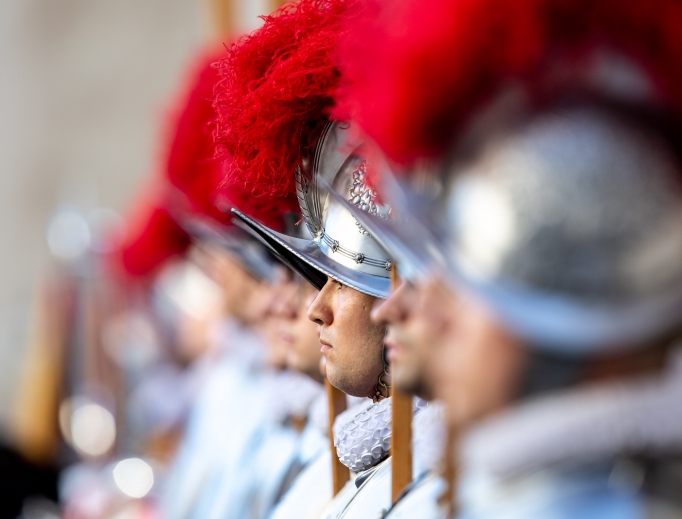
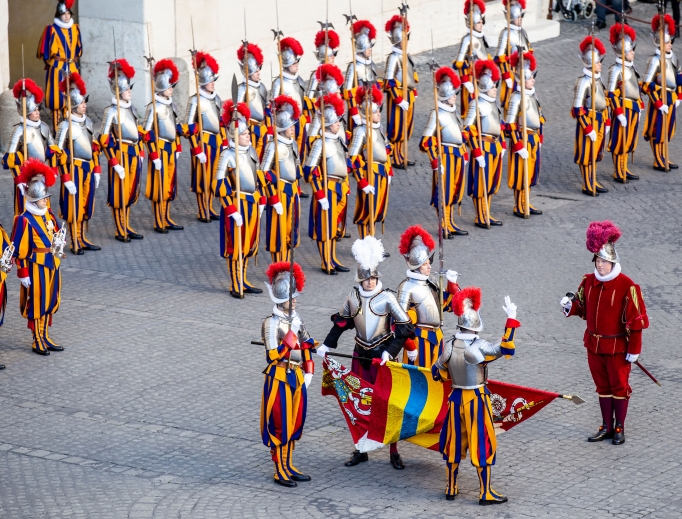
Between Faith and Tradition
The Pontifical Swiss Guard was founded in 1506 by Pope Julius II and has always enjoyed a reputation of excellence. Indeed, the Swiss mercenaries used to be considered the most qualified and faithful fighters in the world. The legacy of papal trust toward the Swiss continues to endure to this day.
“We haven’t changed,” Robi Curkovic, a new recruit, told the Register. “We, the Swiss people, are able to keep the professional secrecy better than anyone. Our discretion, together with our precision and efficiency, allowed us to keep the popes’ trust over the centuries.”
Patriotic and family tradition remain consistent motives for young Swiss men desiring to enlist in the elite papal corps. Indeed, many of these young men decide to go to the Vatican to follow the footsteps of their fathers and ancestors. Brothers Théophane and Timothée Gaillard, for instance, decided to put themselves at the service of the Holy Father more than 20 years after their father did.
“Nowadays, to engage with the Pope doesn’t only imply defending him physically, but also defending what he represents and his beliefs,” said Timothée Gaillard, who took the oath on May 6, two years after his brother. Such commitment, he told the Register, is also a way to repay the Church for everything he has received from her, especially through his education in Morges. The special mission of the Swiss Guard would be difficult to execute without a solid understanding of the Catholic faith, according to Théophane Gaillard.
“I am here as a soldier of Christ, because the Pope represents Christ on earth, and it gives me the strength to never give up,” he said.
It is also faith that led Grandjean to the Vatican seven years ago. In his Diocese of Fribourg, he was an altar server and a lector at Mass, and his faith intensified at the Vatican.
“My faith grew here in a more personal way, to the point that, at the end of this year, I will enter the seminary,” he said, explaining that the many moments of quiet serenity he experienced while standing guard at the Apostolic Palace gave him the precious opportunity to meditate on his life and where God was leading him.
“People come here with various motivations, and some of them may not have a strong faith,” he said. “But they will acquire it here — I saw that happen many times.”
All of the Swiss Guards interviewed by the Register seem to agree that their experience serving the Pope will have a long-lasting impact on them.
Guard Robi Curkovic, who doesn’t intend to stay longer than the mandatory two-year cycle, is convinced that this experience will always be a great source of inspiration for his life back in Switzerland.
“It will be marked in my memory forever,” he said. “It has strengthened my faith beyond my expectations, and I am sure it will be a huge benefit for my future occupation.”
Europe correspondent Solène Tadié writes from Rome.
- Keywords:
- solène tadié
- swiss guards
- vatican















